The 9M133 Kornet (Russian: Корнет; "Cornet", NATO reporting name AT-14 Spriggan, export designation Kornet-E) is a modern Russian man-portable anti-tank guided missile (ATGM) intended for use against main battle tanks. It was first introduced into service with the Russian army in 1998. The Kornet is among the most capable Russian ATGMs. It is not intended to fully replace previous systems, due to its high cost. The Kornet comes in variants with thermobaric warheads for use against soft targets. It was further developed into the 9M133 Kornet-EM, which has increased range, fire-and-forget capability, and an improved warhead. The Kornet has been widely exported and is produced under license in several countries. It was first used in combat in 2003 and has since been used in many conflicts. The NATO reporting name AT-14 Spriggan is derived from the spriggan, a legendary creature from Cornish faery lore.
- kornet
- 9m133
- корнет
1. Development
The Kornet anti-tank missile was unveiled in October 1994 by the KBP Instrument Design Bureau.[1] The missile started development in 1988 as a modular, universal system able to engage any target from a mix of platforms using a reliable laser beam guidance system that was simple to use. It is a heavy ATGM, superior to the earlier 9K111 Fagot (NATO: AT-4 Spigot) and 9K113 Konkurs (NATO: AT-5 Spandrel) wire-guided ATGMs, but not to replace them (due to the cost).[2] The missile entered service in the Russian army in 1998.[3] Its export designation is the Kornet-E.[4] The 9P163M-1 Kornet-T tank destroyer entered service in 2012.[5]
North Korea has developed a clone of the Kornet known as the Bulsae-3 (English: Firebird-3), which was first revealed on February 27, 2016 publicly during a demo test.[6][7]
The 9M133F-1 Kornet variant with a thermobaric warhead was expected to enter serial production in 2019, according to a company report.[8]
2. Description
The 9M133 missile together with its 9P163-1 tripod launcher and 1PN79-1 thermal sight forms the 9K135 missile system,[9] which can be carried and operated by a two-person infantry crew. The transfer to the firing position takes less than one minute, and preparation and production of a shot in at least one second.[10] Kornet anti-tank missile system has been fitted with the ‘top attack’ capability.[11]
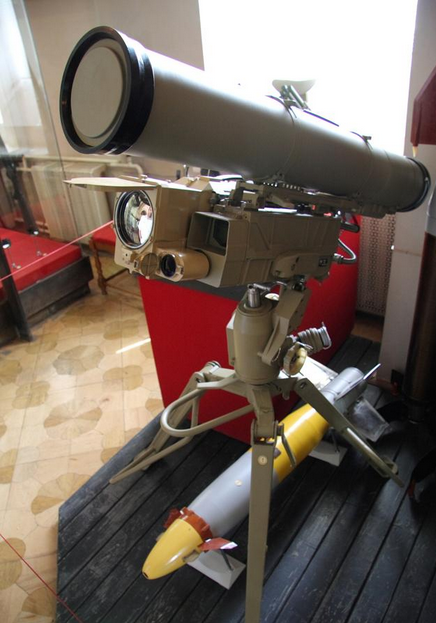
In addition to an infantry portable version, the 9K133 system has been integrated into a variety of other vehicles and weapons systems as either an upgrade package or a new weapon system. The 9K133 has been fitted into a BMP-3 to form the 9P163M-1 tank destroyer and is similar in function to the Khrizantema missile system. The 9P163M-1 carries two 9M133 missiles on launch rails, which are extended from a stowed position during transit. Missile are re-loaded automatically by the tank destroyer from an internal magazine with 16 rounds (missiles are stored and transported in sealed canisters).[12] NBC protection is provided for the two crew (gunner and driver) of each 9P163M-1 in addition to full armour protection equivalent to the standard BMP-3 chassis. The guidance system of the 9P163M-1 allows two missiles to be fired at once, each operating on different guidance (laser) channels.
The KBP Instrument Design Bureau has also marketed the 9M133 missile as part of the Kvartet system for mounting on vehicles and boats; the system has four missiles on ready to launch rails along with associated guidance and sighting system all packaged in a single turret; the guidance system also allows two missiles to be fired at once. The turret has space for an additional five rounds and is operated by a single individual.[13] Another upgrade possibility is the Kliver missile and gun turret, seen as an upgrade option for the BTR series of APC, BMP-1 IFV and patrol boats. It has similar capabilities as the Kvartet turret, but also carries a 30 mm 2A72 cannon; turret weight is 1,500 kg.[14] Finally the 9M133 is also available in the BEREZHOK turret upgrade also made available by KBP.[15] Since 2014, its serial production has been resumed for the domestic market with the designation B05YA01.[16][17]
2.1. Kornet-EM
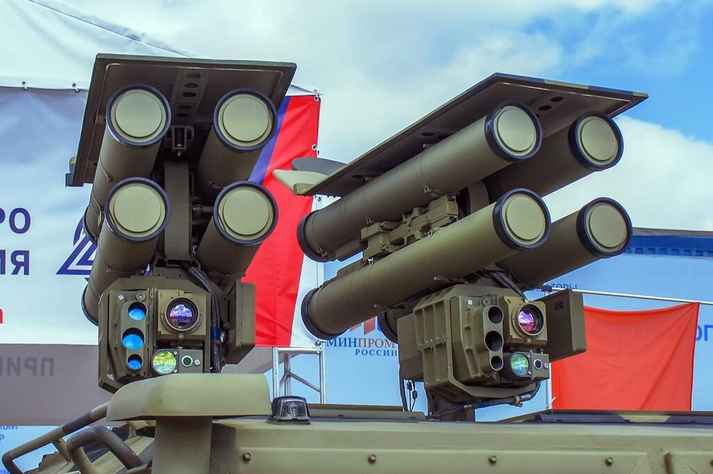
The 9M133 Kornet-EM is an improved variant introduced in 2012 that is designed to defeat vehicles with explosive reactive armor (ERA), is jamming resistant, and uses an automatic target tracker which essentially turns it into a "fire and forget" missile. The "fire and forget" capability allows a vehicle equipped with twin launchers to attack two different targets at once, increasing its rate of fire, decreases the number of vehicles needed for a mission, and can defeat vehicles equipped with an active protection system through salvo fire at one target.[18] The system's use of an autotracker can make it effective against low-flying aerial threats like helicopters and unmanned aerial vehicles (UAVs).[19][20]
Kornet-EM is mainly used on the Kornet-D system.[21][22] Iran also produces an indigenous system similar to the Kornet-D called the Pirooz, that uses a different launch vehicle and different electro-optical sight configuration.[23]
The Kornet-EM first entered service with the Russian Army;[24] its first export customer was Bahrain.[25] It has also been exported to Algeria.[26] It is built under license in Saudi Arabia[27][28] and Iran.[23]
3. Combat History
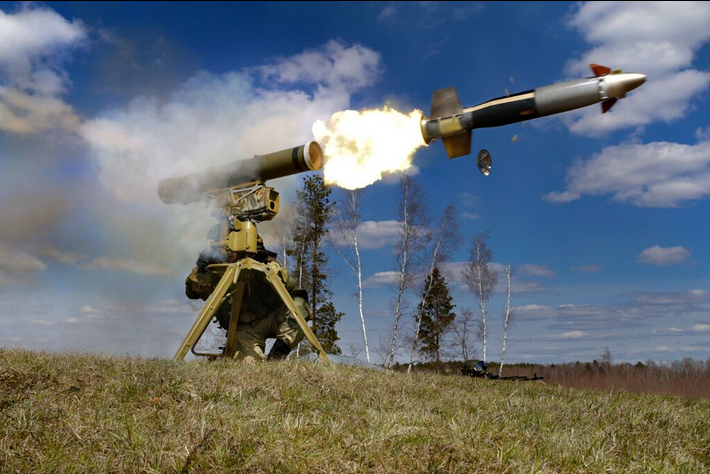
During the Iraq War, Kornets were used by some groups of Iraqi special forces to attack U.S. armored vehicles, disabling at least two Abrams tanks and one Bradley infantry fighting vehicle in the opening week of the war.[29][30]
The second verified episode of the Kornet ATGM in combat use occurred during the 2006 Lebanon War, where the missiles, reportedly supplied by Syria, were used by Hezbollah fighters to destroy up to four Israeli Merkava tanks.[31] Kornets pierced the armor of 24 tanks in total.[32][33] One of the first detailed accounts of IDF's successful capture of Kornet ATGMs on Hezbollah positions in the village of Ghandouriyeh appeared in The Daily Telegraph article, which also reported that the boxes were marked with "Customer: Ministry of Defense of Syria. Supplier: KBP, Tula, Russia".[34] Several months after the cease-fire, reports have provided sufficient photographic evidence that Kornet ATGMs were indeed both in possession of, and used by, Hezbollah in this area.[35][36]
Israel claims that Russian weapons were smuggled to Hezbollah by Syria, and Israel has sent a team of officials to Moscow to show Russia the evidence of what they say can only be Syrian weapons transfers.[37] Despite initial public denials by the Russian officials that any proof of actual use of Kornet by Hezbollah has been presented,[38][39] the Russian government in fact has moved to tighten control over the use of Russian-made weapons by the importing states, suggesting that the visit of the Israeli delegation did bear fruit, although it might have nothing to do with Kornet.[40] On 6 December 2010, a Kornet launched from the Gaza strip penetrated the outer armour of a Merkava Mark III tank on the Israeli side of the border, but it caused no injuries.[41]
On 7 April 2011 Hamas claimed responsibility for a missile strike on an Israeli yellow school bus which killed a 16-year-old boy, Daniel Viflic,[42][43] and wounded another civilian (all the other children who were on the bus got out few minutes earlier). According to Israeli military spokesman, the bus was hit by a Kornet missile.[44]
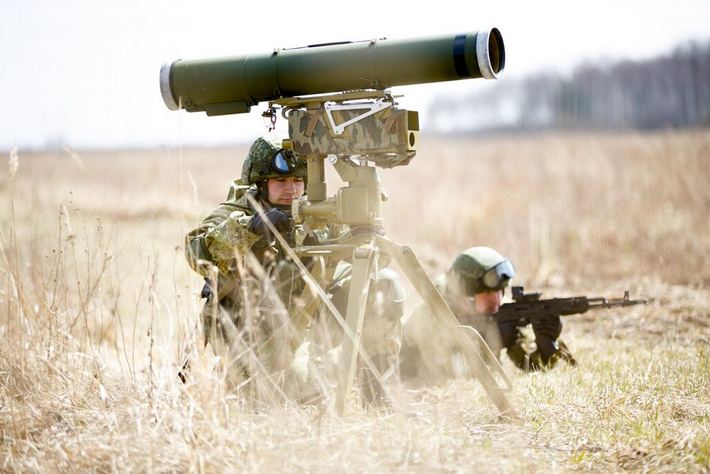
During the fighting between Israel and Hamas in Gaza in the summer of 2014, of the 15 anti-tank missiles which launched on Israeli tanks that were intercepted by the Israeli active protection system Trophy, most were of the Kornet type. In some cases the Kornet launchers were destroyed after the Trophy system had detected the launch and directed the tank's main gun to the launcher position.[45]
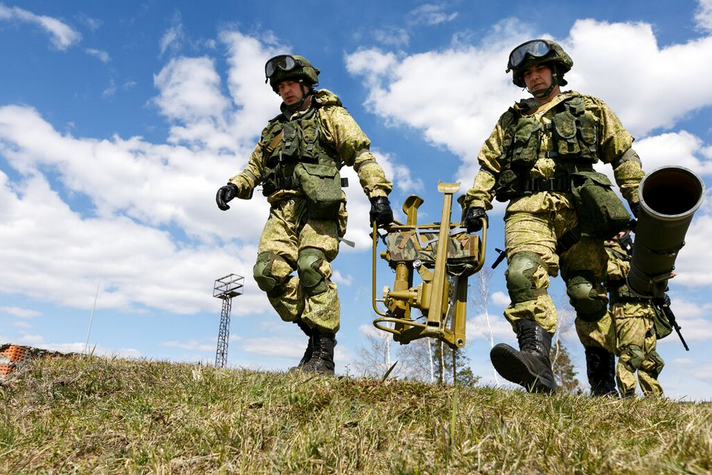
In the summer of 2014 the armor of Iraqi Army M1A1 Abrams tanks were penetrated 5 times; Kornet missiles were responsible for at least some of these penetrations.[46] In September 2014, the Iraqi Army used Kornet missiles against Islamic State militants for the first time. Iraqi security forces claimed five IS-operated vehicles along with fighters were destroyed in Diyala Governorate. Three Iraqi Army squadrons have been trained to use the Kornet anti-tank missile.[47]
In the January 2015 Shebaa farms incident, Hezbollah fired some Kornet anti-tank missiles against two Israeli Humvees. A soldier and an officer were killed. In 2015 Iran succeeded in reverse-engineering the Kornet. Iran arms Hezbollah and there is speculation Iranian Kornets were used against Israel in a border attack on the 29th Jan 2015.[48]
After the 2011 Libyan civil war the Gadaffi regime's stockpiles were looted and many weapons, including Kornet missiles, proliferated through the region. Many of the Kornet missiles fell in the hands of Ansar Bait al-Maqdis in Egypt's Sinai peninsula. In the Sinai insurgency, Kornet missiles become a key weapon in attacking Egyptian Armed Forces. Ansar Bait al-Maqdis has used the missile on M1A1 and M60 tanks,[49] helicopters (AH-64)[50][51] and a navy ship.[52] The group has since became a branch of ISIL, renaming itself ISIL-Sinai Province.[53]
Reuters have found remains of used Kornet missiles in Ukraine in the context of the 2014–15 Russian military intervention in Ukraine. Since Ukraine is not a known operator of Kornet, Reuters quoted the International Institute for Strategic Studies that the missiles were most likely sent into Ukraine by Russia.[54][55][56]
Russia has sent over 1,000 Kornet-9M133 third-generation anti-tank guided missiles to the Syrian Government who have used them extensively against armour and ground targets to fight Jihadists and rebels.[57][58][59] In 2016, a Syrian Army Solntsepyok TOS-1 was destroyed by a Kornet missile from unknown Syrian opposition forces.[60]
Iran has supplied their license-built Kornet missiles, under their name Dehalivieh, to at least one Iraqi non-state actor. In addition, Kornet missiles were widely used in the Iraqi Civil War by the Iraqi government and the Popular Mobilization Units.[61]
In January 2017, the German newspaper Die Welt reported that ISIL fighters used Kornets to destroy six Leopard 2 tanks used by the Turkish military in Syria.[62][63] An ISIL propaganda video released in March 2017 showed ISIL fighters capturing two Kornets being transported in Syria, which show the manufacturing year of 2016.
On September 1, 2019, a Kornet was used by Hezbollah forces to fire on Israeli military stations in retaliation for the bombings of a Hezbollah media office a week earlier. Israel responded with artillery barrages on Lebanese villages close to the border, specifically Aitaroun and Maroun al-Ras, which set fire to a number of civilian crop fields.[64] [65]
4. Missile Variants
| [66] | 9M133-1 (Kornet/Kornet-E) | 9M133M-2 (Kornet-M/Kornet-EM) | 9M133F-1 (Kornet/Kornet-E) | 9M133F-2 (Kornet-M/Kornet-EM) | 9M133F-3 (Kornet-M/Kornet-EM) |
|---|---|---|---|---|---|
| Diameter | |||||
| Length | |||||
| Weight (including container) | 29 kg (64 lb) | 31 kg (68 lb) | 29 kg (64 lb) | 31 kg (68 lb) | 33 kg (73 lb) |
| Speed | >250 m/s | 300 m/s | >250 m/s | 300 m/s | 320 m/s |
| Range (daytime) | 100–5,500 m | 150–8,000 m | 100–5,500 m | 150–8,000 m | 150–10,000 m |
| Warhead | 152 mm tandem HEAT 1,000–1,200 mm RHA penetration after ERA 3–3.5 m of concrete |
152 mm tandem HEAT 1,100–1,300 mm RHA penetration after ERA 3–3.5 m of concrete |
Thermobaric 10 kg (22 lb) TNT equivalent | Thermobaric 10 kg (22 lb) TNT equivalent | Blast Fragmentation |
5. Operators
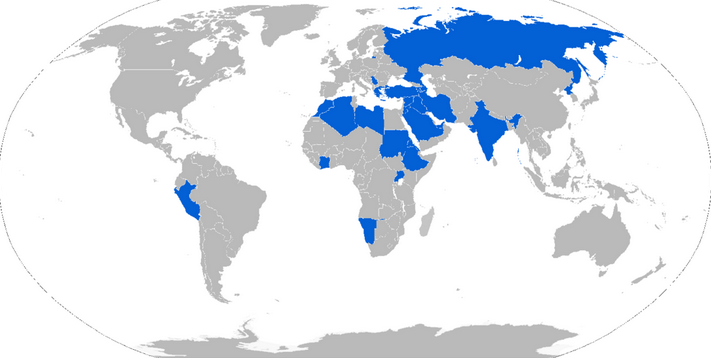
5.1. Current Operators
- Algeria – 3,000 missiles ordered in 2006.[67][68] 340 Berezhok turrets were ordered in 2014 to equip BMP-1s and BMP-2s. Kornet-EM also ordered.
- Armenia[69] – 50 launchers, 200 missiles received in 2013.
- Azerbaijan[70]
- Bahrain – Kornet-EM ordered[71][72]
- Ethiopia[73]
- Eritrea – 80 Kornet-E's were delivered in 2005[68]
- Greece – 196 launchers with 1,100+ missiles, in service as of 2008.[74] All Humvee-mounted
- India – 3,000 missiles including over 250 launchers were delivered between 2003 and 2006.[68]
- Iran – Licensed local production under the name "Dehlavie" (دهلاویه);[75][76][77] 9M133-1 Kornet-E, 9M133F-1 (Kornet-EM),[78] and Kornet-D[79] systems known to be produced
- Iraq – reported since 2014[80]
- Ivory Coast – reported[73]
- Jordan – 200 Kornet-E launchers with 2,000 missiles.[3]
- Kuwait[81]
- Libya – Used in 2011 Civil War by Gaddafi loyalists[82]
- Morocco – 80 Kornet missiles ordered in 2000.[14][68]
- Namibia – unknown number ordered in 2014.[83]
- North Korea – Unknown, reversed engineered Kornet-E under designation of Bulsae-3 [84]
- Pakistan – 52 Kornet-E ATGWs ordered in 2017-2018 and likely to have included hundreds of missiles.[85]
- Peru – 288 missiles and 24 launchers plus training simulators and technical support. The contract (worth US$24 million) was signed in 2008. All missiles delivered in January 2010. As of June 2013, it is currently negotiating the purchase of additional units.[86]
- Qatar[87]
- Russia – [88] (2009). 540 Berezhok turrets were ordered in 2017 to equip BMP-2 and BMD-2 vehicles.[89]
- Saudi Arabia Kornet-EM produced under license[90]
- Sudan[91]
- Syria – 100 Kornet-E launchers with 1,000 missiles as of 2013.[92] Received about 1,500 more between 2002 and 2006.[68][93]
- Turkey – 80 launchers with 800 missiles[94]
- UAE[73][95]
- Uganda – 1,000 Kornet-E missiles ordered in 2010 and delivered between 2012 and 2013.[68]
5.2. Non-State Operators
- Ahrar al-Sham[73]
- Free Syrian Army – [91]
- Hamas – [44][96]
- Hezbollah – Used in 2006 Lebanon war, 2015 Shebaa Farms operation[35][36] and Syrian civil war
- Iraqi Kurdistan – KDP Peshmerga[73]
- Islamic State[97][98]
- Islamic State Sinai Province – [51]
- Lugansk People's Republic[73]
- Popular Front for the Liberation of Palestine [99]
- Popular Mobilization Units[61]
- Tahrir al-Sham[73]
- Template:Country data Houthis [100][101]
5.3. Potential Operators
- Serbia – They expressed the need for mounting on new MPV BOV M16 Miloš.
- Egypt – [102]
The content is sourced from: https://handwiki.org/wiki/Engineering:9M133_Kornet
References
- "Kornet (AT-14)". Federation of American Scientists. 1999-06-19. http://www.fas.org/man/dod-101/sys/land/row/at-14.htm. Retrieved 2008-11-08.
- "ПТРК "КОРНЕТ"". btvt.narod.ru (Russian). 2003–2008. http://www.btvt.narod.ru/4/kornet.htm. Retrieved 2008-11-08.
- "Kornet". http://www.deagel.com/Anti-Armor-Weapons-and-Missiles/Kornet_a001010001.aspx. Retrieved 28 November 2016.
- "KORNET-E ANTITANK MISSILE SYSTEM". KBP Instrument Design Bureau. 2008. Archived from the original on 1 November 2008. https://web.archive.org/web/20081101231258/http://www.kbptula.ru/eng/atgw/kornet.htm. Retrieved 2008-11-08.
- ARG. "Kornet-T Anti-Tank Missile Carrier - Military-Today.com". http://www.military-today.com/missiles/kornet_t.htm.
- "Archived copy". https://www.nknews.org/2016/03/new-variant-of-anti-tank-guided-weapon-tested-in-north-korea/.
- "Archived copy". https://www.gladiusds.com/news/north-koreas-anti-tank-capabilities/.
- https://tass.com/defense/1074246
- "Designations of Soviet and Russian Military Aircraft and Missiles". http://www.designation-systems.net/non-us/soviet.html#_Listings_AT.
- "Русский "Корнет" - убийца "Абрамсов"". http://vpk.name/news/125430_russkii_kornet__ubiica_abramsov.html. Retrieved 10 May 2015.
- "Archived copy". http://tass.com/defense/1018521.
- "Kornet E Laser Guided Anti-Tank Missile". Defence Update. 2006-07-26. Archived from the original on July 5, 2008. https://web.archive.org/web/20080705042917/http://www.defense-update.com/products/k/kornet-e.htm. Retrieved 2008-11-17.
- "KVARTET SYSTEM WITH KORNET-E ANTITANK MISSILES". KBP Instrument Design Bureau. 2008. Archived from the original on 1 November 2008. https://web.archive.org/web/20081101230725/http://www.kbptula.ru/eng/atgw/kvartet.htm. Retrieved 2008-11-17.
- "Kornet E Anti-Armour Missile, Russia". Army-technology.com. 2008. Archived from the original on 17 October 2008. https://web.archive.org/web/20081017095835/http://www.army-technology.com/projects/kornet/. Retrieved 2008-11-17.
- ""BEREZHOK" The Weapon System With the Fire Control System and Kornet-E Guided Weapon Designed to Equip Armoured Vehicles". KBP Instrument Design Bureau. 2008. Archived from the original on 14 December 2008. https://web.archive.org/web/20081214184654/http://www.kbptula.ru/eng/bron/light/bmp2.htm. Retrieved 2008-11-17.
- "ОАО "Конструкторское бюро приборостроения" - Рейтинг 100 влиятельных людей Тульского региона". http://www.kbptula.ru/ru/novosti/novosti-kbp/415-rejting-100. Retrieved 10 May 2015.
- "ОАО "Конструкторское бюро приборостроения" - Б05Я01". http://www.kbptula.ru/index.php/ru/razrabotki-kbp/kompleksy-vooruzheniya-legkobronirovannoj-tekhniki-i-tankov/b05ya01. Retrieved 10 May 2015.
- The new anti-tank guided missile Kornet-EM is presented at Moscow air Show MAKS-2011 - Armyrecognition.com, 17 August 2011 http://www.armyrecognition.com/august_2011_news_defense_army_military_industry_uk/new_anti-tank_guided_missile_kornet-em_is_presented_at_moscow_air_show_maks-2011_1708111.html
- Russian Ministry of Defense to finalize the tests of Kornet-EM anti-tank guided missile - Armyrecognition.com, 8 October 2016 http://www.armyrecognition.com/october_2016_global_defense_security_news_industry/russian_ministry_of_defense_to_finalize_the_tests_of_kornet-em_anti-tank_guided_missile_tass_10810164.html
- Administrator. "Russian armed forces to receive Kornet-M and 9K115 Metis-M1 anti-tank-guided missiles TASS 12605161 - weapons defence industry military technology UK - analysis focus army defence military industry army". http://www.armyrecognition.com/weapons_defence_industry_military_technology_uk/russian_armed_forces_to_receive_kornet-m_and_9k115_metis-m1_anti-tank-guided_missiles_tass_12605161.html.
- "Russian Kornet-EM: Deadliest Tank Killer with Air Defense Capability". https://www.strategic-culture.org/news/2016/08/24/russian-kornet-deadliest-tank-killer-with-air-defense-capability.html.
- "Kornet-EM Anti-Tank Guided Missile System - Army Technology". http://www.army-technology.com/projects/kornet-em-anti-tank-guided-missile-system/.
- "KLKAMASH on Twitter". https://twitter.com/klkamashiq/status/839477146783477761.
- "Russia to Deliver Advanced Anti-Tank Missile Systems to Foreign Customers". Sputnik News. https://sputniknews.com/military/201509091026796074.
- "Bahrain becomes launch customer for Russian Kornet-EM system - Jane's 360". http://www.janes.com/article/54745/bahrain-becomes-launch-customer-for-russian-kornet-em-system.
- Martin, Guy. "Algerian Su-30MKA and Kornet deliveries moving forward - defenceWeb". http://www.defenceweb.co.za/index.php?option=com_content&view=article&id=45933:algerian-su-30mka-and-kornet-deliveries-moving-forward&catid=7:Industry&Itemid=116.
- "تعرف على Kornet-EM الصاروخية المنضم للخدمة بالسعودية" (in Arabic). Al Arabiya. https://www.alarabiya.net/ar/science/2017/10/08/%D8%A8%D8%A7%D9%84%D9%81%D9%8A%D8%AF%D9%8A%D9%88-%D9%85%D9%86%D8%B8%D9%88%D9%85%D8%A9-Kornet-EM-%D8%A7%D9%84%D8%B5%D8%A7%D8%B1%D9%88%D8%AE%D9%8A%D8%A9-%D8%A7%D9%84%D9%85%D8%B6%D8%A7%D8%AF%D8%A9-%D9%84%D9%84%D8%AF%D8%A8%D8%A7%D8%A8%D8%A7%D8%AA-.html.
- "Saudi Arabia and Russia sign S-400 MOU - Jane's 360". http://www.janes.com/article/74677/saudi-arabia-and-russia-sign-s-400-mou.
- "Kornet (AT-14)". GlobalSecurity.org. http://www.globalsecurity.org/military/world/russia/at-14.htm.
- "Russian Kornet Anti-Tank Missile FAQ". ABC News. 6 January 2006. https://abcnews.go.com/International/story?id=79586&page=1. Retrieved 28 November 2016.
- "Russian Anti-Armour Weapons and Israeli Tanks in Lebanon". Moscow Defence Brief. 2007. http://mdb.cast.ru/mdb/2-2007/item2/item1/. Retrieved 2008-11-18.
- "waronline.org - Потери бронетанковой техники во Второй Ливанской войне". Archived from the original on 25 April 2015. https://web.archive.org/web/20150425051608/http://www.waronline.org/IDF/Articles/history/2nd-lebanon-war/acv-losses/. Retrieved 10 May 2015.
- "Танк "Меркава" (Израиль)". http://3mv.ru/publ/vooruzhenie_drugikh_stran/tank_merkava_izrail/13-1-0-9130. Retrieved 10 May 2015.
- Blomfield, Adrian (2006-08-15). "Israel humbled by arms from Iran". The Daily Telegraph (London). https://www.telegraph.co.uk/news/1526407/Israel-humbled-by-arms-from-Iran.html.
- "Proof of the location of the Hezollah's military infrastructure and operational activities carried within the civilian population". IICC: p. 92. Archived from the original on September 27, 2007. https://web.archive.org/web/20070927033129/http://www.terrorism-info.org.il/malam_multimedia/English/eng_n/pdf/human_shields_eb.pdf.
- "Противотанковое оружие "Хизбаллы": трофеи Второй Ливанской войны (Russian)". Archived from the original on 2014-04-21. https://web.archive.org/web/20140421053641/http://www.waronline.org/IDF/Articles/2nd-lebanon-hezbollah-atw/index.html#4.
- Marcus, Jonathan (2006-08-15). "Tough lessons for Israeli armour". BBC News Online. http://news.bbc.co.uk/2/hi/middle_east/4794829.stm.
- "Israel never proved use of Russian missiles by Hizbollah – Ivanov". RIA Novosti. 2006-08-25. http://en.rian.ru/russia/20060825/53115965.html.
- "Russia denies Hezbollah arms link". BBC News Online. 2006-08-25. http://news.bbc.co.uk/2/hi/europe/5284938.stm.
- "Provisions for the control of the compliance by foreign states to the rules of use of military equipment supplied by the Russian Federation". Government of the Russian Federation. 2006-10-11. Archived from the original on 2008-08-04. https://web.archive.org/web/20080804005753/http://www.government.ru/government/governmentactivity/rfgovernmentdecisions/archive/2006/10/11/6401484.htm.
- "Ashkenazi: IDF tank hit by Kornet missile". ynet. http://www.ynetnews.com/articles/0,7340,L-4002366,00.html. Retrieved 13 November 2014.
- "Teen hit by anti-tank missile dies of wounds". ynet. http://www.ynetnews.com/articles/0,7340,L-4058157,00.html. Retrieved 10 May 2015.
- "Teen Victim of Bus Attack Dies - Inside Israel - News - Arutz Sheva". Arutz Sheva. http://www.israelnationalnews.com/News/News.aspx/143618. Retrieved 10 May 2015.
- Hamas claims responsibility for missile strike on bus that wounded boy , CNN http://edition.cnn.com/2011/WORLD/meast/04/07/israel.gaza.violence/
- "מבצע "צוק איתן" - כיפת הברזל של הטנקים פועלת בעזה: "התקפית" - וואלה! חדשות". וואלה! חדשות. http://news.walla.co.il/?w=/2689/2770561. Retrieved 13 November 2014.
- "Iraqi Abrams losses revealed". http://www.janes.com/article/39550/iraqi-abrams-losses-revealed. Retrieved 10 May 2015.
- Iraqi Army Uses Russian Anti-Tank Guided Missile Systems Against IS for First Time - En.Ria.ru, 22 September 2014 http://en.ria.ru/military_news/20140922/193173741/Iraqi-Army-Uses-Russian-Anti-Tank-Guided-Missile-Systems-Against.html
- Rosen, Armin (29 January 2015). "This New Iranian-Built Anti-Tank Missile Could Restrain Israel's Options In Lebanon". Business Insider. http://www.businessinsider.com.au/this-new-iranian-built-anti-tank-missile-could-restrain-israels-options-in-lebanon-2015-1?r=US&IR=T. Retrieved 28 November 2016.
- "M60 destroyed in Sinai (Egypt)" (in en-US). Tank Nut Stan. 2015-07-29. https://tanknutstan.wordpress.com/2015/07/29/m60-destroyed-in-sinai-egypt/.
- "Egyptian soldiers killed in Sinai as protest toll rises to 49". Reuters. 2014-01-26. https://www.reuters.com/article/us-egypt-clashes/egyptian-soldiers-killed-in-sinai-as-protest-toll-rises-to-49-idUSBREA0P0CO20140126. Retrieved 2017-12-24.
- "Islamic State claims air base attack in Egypt's North Sinai". Reuters. 2017-12-20. https://www.reuters.com/article/us-egypt-security-claim/islamic-state-claims-air-base-attack-in-egypts-north-sinai-idUSKBN1EE1SA. Retrieved 2017-12-24.
- "Egypt ship 'hit by Sinai missile'" (in en-GB). BBC News. 2015-07-16. https://www.bbc.com/news/world-middle-east-33557180.
- Kirkpatrick, David D. (2014-11-10). "Militant Group in Egypt Vows Loyalty to ISIS" (in en-US). The New York Times. ISSN 0362-4331. https://www.nytimes.com/2014/11/11/world/middleeast/egyptian-militant-group-pledges-loyalty-to-isis.html.
- "Exclusive: Charred tanks in Ukraine point to Russian involvement". Reuters. https://www.reuters.com/article/2014/10/23/us-ukraine-crisis-tanks-exclusive-idUSKCN0IC1GE20141023. Retrieved 10 May 2015.
- "Further evidence of 9K135 Kornet ATGWs found in Ukraine". Armament Research Services. http://www.armamentresearch.com/further-evidence-of-9k135-kornet-atgws-found-in-ukraine/. Retrieved 10 May 2015.
- "Kornet Anti-Tank Guided Missile: Kornet Anti-Tank Guided Missile (ATGM) in Ukraine Points to Russian Presence – Reuters. PHOTOS - fighter, weapons, Russia, separatism, terrorism, Ukraine, Russian Aggression Against Ukraine, Evidence of Russian aggression in Ukraine, Kornet Anti-Tank Guided Missile (26.10.14 09:39) « Photo news - EN.Censor.net". EN.Censor.net. http://en.censor.net.ua/photo_news/308891/kornet_antitank_guided_missile_atgm_in_ukraine_points_to_russian_presence_reuters_photos. Retrieved 10 May 2015.
- "Russia Delivers Kornet Anti-Tank Guided Missiles To Syria". http://www.defenseworld.net/news/13790/Russia_Delivers_Kornet_Anti_Tank_Guided_Missiles_To_Syria.
- Fahd, Majd (9 May 2016). "WATCH: SAA Kornet ATGM destroys rebels' tank in southern Aleppo (video)". https://www.almasdarnews.com/article/moment-saa-atgm-destroys-jihadist-tank-southern-aleppo/. Retrieved 28 November 2016.
- iftaab bostan (24 February 2016). "Syrian Army Kornet Missile VS ISIS". https://www.youtube.com/watch?v=JNwQr3ygQB8. Retrieved 28 November 2016.
- "Russian TOS-1A Solntsepyok Annihilated by ATGM Kornet". http://www.apacheclips.com/boards/media/6557-Russian-TOS-1A-Solntsepyok-Annihilated-by-ATGM-Kornet. Retrieved 28 November 2016.
- "Iraq: Turning a blind eye: The arming of the Popular Mobilization Units". Amnesty International. 5 January 2017. https://www.amnesty.org/download/Documents/MDE1453862017ENGLISH.PDF.
- Hegmann, Gerhard (12 January 2017). "Syrien: Leopard-2-Verluste kratzen am deutschen Panzer-Mythos". https://www.welt.de/wirtschaft/article161078829/IS-Kaempfer-zerstoeren-den-deutschen-Panzer-Mythos.html.
- Sputnik. "Daesh Terrorists Destroy Myth of Germany's Indestructible Leopard 2 Tank". https://sputniknews.com/europe/201701141049591403-german-leopold-tank-syria-daesh/.
- https://www.jpost.com/Breaking-News/IDF-fires-artillery-shells-into-Lebanon-report-600309
- https://www.jpost.com/Arab-Israeli-Conflict/Security-footage-captures-Hezbollah-missile-narrowly-missing-IDF-vehicle-600481
- 9K133 Kornet - Weaponsystems.net http://weaponsystems.net/weaponsystem/BB06%20-%20AT-14%20Spriggan.html
- "Algeria could become Russia's main military partner – paper". RIA Novosti. 2007-03-29. Archived from the original on 8 December 2008. https://web.archive.org/web/20081208232549/http://en.rian.ru/russia/20070329/62781987.html. Retrieved 2008-11-17.
- "Sipri: Trade Registers". Archived from the original on 23 April 2014. https://web.archive.org/web/20140423140358/http://portal.sipri.org/publications/pages/transfer/trade-register. Retrieved 10 May 2015.
- "Armenian Kornet-E anti-tank missile system makes public debut". Jane's. 2018-02-08. http://www.janes.com/article/77633/armenian-kornet-e-anti-tank-missile-system-makes-public-debut. Retrieved 2018-02-08.
- "Azerbaijan conducts military exercise – paper". Panarmenian. 2010-12-15. http://www.panarmenian.net/eng/world/news/58592/Azerbaijan_responses_to_Artsakh_military_exercise_with_maneuvers_in_Nakhijevan. Retrieved 2010-12-16.
- Bahrain to purchase Russian-made mobile Kornet-EM anti-tank missiles - Armyrecognition.com, 14 August 2014 http://www.armyrecognition.com/august_2014_global_defense_security_news_uk/bahrain_to_purchase_russian-made_mobile_kornet-em_anti-tank_missiles_1408143.html
- Administrator. "Russia to supply Kornet-E anti-tank guided missile to Bahrain - September 2017 Global Defense Security news industry - Defense Security global news industry army 2017 - Archive News year". https://www.armyrecognition.com/september_2017_global_defense_security_news_industry/russia_to_supply_kornet-e_anti-tank_guided_missile_to_bahrain.html.
- International Institute for Strategic Studies, The Military Balance, 2017
- Αμυντική Βίβλος 2008–2009 (journal), Defence Net Media, page 64
- "Mass producing of Dehlavie". Archived from the original on 2012-07-12. https://web.archive.org/web/20120712001049/http://www.mod.ir/content/%D8%A7%D9%81%D8%AA%D8%AA%D8%A7%D8%AD-%D8%AE%D8%B7-%D8%AA%D9%88%D9%84%D9%8A%D8%AF-%D9%88-%D8%AA%D8%AD%D9%88%D9%8A%D9%84-%D8%A7%D9%86%D8%A8%D9%88%D9%87-%D8%B3%D8%A7%D9%85%D8%A7%D9%86%D9%87-%D8%B6%D8%AF%D8%B2%D8%B1%D9%87-%D8%AF%D9%87%D9%84%D8%A7%D9%88%D9%8A%D9%87-%D8%A8%D8%A7-%D8%AD%D8%B6%D9%88%D8%B1-%D9%88%D8%B2%D9%8A%D8%B1-%D8%AF%D9%81%D8%A7%D8%B9.
- "Iran Inaugurates Production Line of New Anti-Armor Missile System". Farsnews. 2012-07-07. http://english2.farsnews.com/newstext.php?nn=9103085396.
- "Pictures of Dehlavie". Mehrnews. http://www.mehrnews.com/fa/newsdetail.aspx?NewsID=1643710.
- "Иран скопировал новейшую российскую ракету". 4 December 2016. https://rg.ru/2016/12/04/iran-skopiroval-novejshuiu-rossijskuiu-raketu.html.
- "Iran develops new Pirooz anti-tank guided missile carrier vehicle - Defence Blog". 8 March 2017. http://defence-blog.com/army/iran-develops-new-pirooz-anti-tank-guided-missile-carrier-vehicle.html.
- ""Siêu diệt tăng" Kornet-D của Nga tham chiến tại Iraq". Báo điện tử Tiền Phong. http://www.tienphong.vn/hanh-trang-nguoi-linh/sieu-diet-tang-kornetd-cua-nga-tham-chien-tai-iraq-762704.tpo. Retrieved 10 May 2015.
- ARG. "Kornet Anti-Tank Guided Missile - Military-Today.com". http://www.military-today.com/missiles/kornet.htm.
- Bouckaert, Peter (2011-08-04). "Bombs Away – A look at Qaddafi's arsenal, now in rebel hands". Foreign Policy (Washington D.C.). https://foreignpolicy.com/articles/2011/04/08/bombs_away.
- "Namibia has ordered AT-14 anti-tank missiles". defenceWeb. http://www.defenceweb.co.za/index.php?option=com_content&view=article&id=42818:namibia-has-ordered-at-14-anti-tank-missiles&catid=50:Land&Itemid=105. Retrieved 2016-04-27.
- https://www.gladiusds.com/news/north-koreas-anti-tank-capabilities
- "Pakistan’s MoDP reveals orders for MANPADSs and other weapon systems in 2017–18". Jane's 360. 8 October 2019. https://www.janes.com/article/91749/pakistan-s-modp-reveals-orders-for-manpadss-and-other-weapon-systems-in-2017-18. Retrieved 8 October 2019.
- http://larazon.pe/especial/8949-ejercito-peruano-adquirira-tanques-t-90s-misiles-kornet-e-lanzamisiles-smerch-sistemas-antiaereos-pantsir-s1-y-vehiculos-centauro-b1.html
- "Archived copy". http://tass.com/politics/1014342.
- KBP News KBP Official Website (in Russian). http://www.kbptula.ru/rus/kbp/news/newsr66.htm
- Administrator. "Russian BMP-2 and BMD-2 upgraded with new Berezhok weapon station - October 2017 Global Defense Security news industry - Defense Security global news industry army 2017 - Archive News year". https://www.armyrecognition.com/october_2017_global_defense_security_news_industry/russian_bmp-2_and_bmd-2_upgraded_with_new_berezhok_weapon_station.html.
- "Russia confirms sale of S-400 missile systems to Saudi Arabia". https://www.rt.com/business/406116-russia-saudi-arabia-s400-delivery/.
- International Institute for Strategic Studies (IISS) (14 February 2018). "The Military Balance 2018" (in english). The Military Balance (Routledge) 118.
- The Military Balance 2013. — P. 404.
- "Archived copy". Archived from the original on 2011-10-02. https://web.archive.org/web/20111002155900/http://www.inss.org.il/upload/%28FILE%291287493352.pdf. Retrieved 2011-09-03.
- "Россия передала Турции противотанковые комплексы (Russian)". Lenta.ru. 2010-07-01. http://lenta.ru/news/2010/07/01/cornet/. Retrieved 2010-07-01.
- "Archived copy". https://sputniknews.com/military/201902171072514845-uae-idex-russia-anti-tank-systems-purchase/.
- Netanyahu Defends Gaza Cease-fire: Our Enemies Begged for It , Ha-Aretz, 14. November 2018 https://www.haaretz.com/israel-news/netanyahu-defends-gaza-cease-fire-our-enemies-begged-for-it-1.6654130
- Hegmann, Gerhard (12 January 2017). "Syrien: Leopard-2-Verluste kratzen am deutschen Panzer-Mythos". https://www.welt.de/wirtschaft/article161078829/IS-Kaempfer-zerstoeren-den-deutschen-Panzer-Mythos.html.
- Sputnik. "Daesh Terrorists Destroy Myth of Germany's Indestructible Leopard 2 Tank". https://sputniknews.com/europe/201701141049591403-german-leopold-tank-syria-daesh/.
- "Another round of escalation after Palestinian terrorists fire an anti-tank missile at an IDF vehicle, wounding four soldiers". November 11, 2012. http://www.terrorism-info.org.il/en/20420/.
- News Of Yemen (2 August 2016). "New footage- Houthis use kornet ATGM to destroy a Saudi tank in Najran 1\8\2016". https://www.youtube.com/watch?v=xQGpMmWolqM.
- "Yemen war 2016- Houthis Launch Russian ATGM "Kornet" Against Saudi Abrams Tank in Jizan 26\7\2016". https://www.youtube.com/watch?v=NEGjTkZJX20.
- "Report: Egypt seeks Russian arms that could undermine treaty with Israel". https://www.jpost.com/Middle-East/Report-Egypt-seeks-Russian-arms-that-could-undermine-treat-with-Israel-344465.
